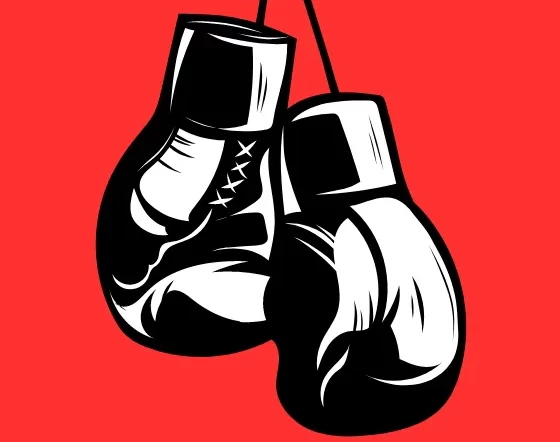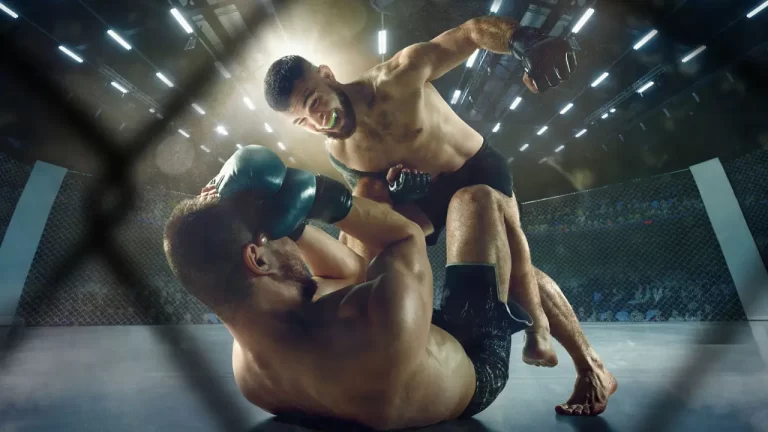MMA for Beginners: The Ultimate Guide to Training
Are you a beginner interested in learning Mixed Martial Arts (MMA)? Look no further! In this comprehensive guide, we’ll cover everything you need to know to get started in MMA. From the basics of the sport to the potential risks, we’ve got you covered.
- MMA training improves fitness, self-defense skills, and discipline for beginners.
- This guide covers choosing the right gym, essential equipment, basic techniques, training, sparring, safety, nutrition, progression, common mistakes, and FAQs for beginners.
What is MMA?
MMA is a full-contact combat sport that combines various martial arts disciplines, including striking, grappling, and wrestling. The goal of MMA is to defeat the opponent by knockout, submission, or a judge’s decision.

A Brief History of MMA
MMA has its roots in ancient Greece, where various forms of combat sports were practiced, including pankration, a combination of boxing and wrestling. In the 1990s, the Ultimate Fighting Championship (UFC) was founded, which popularized MMA in the United States. Since then, MMA has become a global phenomenon, with millions of people participating in the sport worldwide.
How MMA Differs from Other Martial Arts
Unlike other martial arts, such as karate or taekwondo, which focus on specific techniques and styles, MMA is a combination of various martial arts disciplines. MMA fighters must be proficient in striking, grappling, and wrestling, making the sport more challenging and requiring a well-rounded skill set.
Potential Risks and Dangers of MMA Training
Like any combat sport, MMA training comes with potential risks and dangers. Some of these risks include concussions, broken bones, and other injuries. However, these risks can be minimized by proper training techniques, high-quality safety equipment, and experienced trainers.
Benefits of MMA Training for Beginners
Improved Fitness and Health
MMA training is a great way to improve overall fitness and health. The intense physical activity involved in MMA training can help burn calories, build muscle, and improve cardiovascular health.
Self-defense Skills
MMA training can also provide valuable self-defense skills. The techniques learned in MMA can be used to protect oneself in real-life situations, making it a practical skill to learn.
Discipline and Self-esteem
MMA training requires discipline and focus, which can help build self-esteem and confidence. By setting goals and working hard to achieve them, MMA beginners can improve their mental and emotional well-being.
Getting Started with MMA Training for Beginners
Choosing the Right Gym
Choosing the right gym is crucial when starting MMA training. It is important to look for a gym with experienced trainers, a good reputation, and a positive learning environment. Researching local gyms and reading reviews can help find the right gym for beginners.
Essential Equipment
MMA beginners will need some essential equipment to get started, including hand wraps, gloves, shin guards, a mouthguard, and appropriate clothing. It is important to invest in high-quality equipment to ensure safety during training.

Basic MMA Techniques for Beginners
Striking Techniques
Striking techniques in MMA include punches, kicks, knees, and elbows. It is important to learn proper technique and form to execute strikes effectively and avoid injury.
Grappling Techniques
Grappling techniques in MMA include takedowns, submissions, and ground-and-pound. Beginners should focus on learning the fundamentals of grappling techniques, including proper body positioning and leverage.
Takedown Techniques
Takedown techniques in MMA involve taking the opponent to the ground. Beginners should learn basic takedown techniques, including single-leg and double-leg takedowns, and how to defend against takedowns.
| Technique | Description |
|---|---|
| Punches | Punches are one of the most basic striking techniques in MMA. They include the jab, cross, hook, and uppercut. Proper form and technique are crucial to avoid injury and effectively land punches. |
| Kicks | Kicks in MMA include front kicks, roundhouse kicks, and side kicks. Kicks can be used to strike opponents from a distance or to set up other strikes or takedowns. |
| Knees and Elbows | Knees and elbows are powerful striking techniques in MMA. They can be used in close-range combat and can cause significant damage to opponents. |
| Takedowns | Takedowns involve taking the opponent to the ground. This can be done by grabbing the opponent’s legs or body and taking them down to the ground. Proper technique and body positioning are important to successfully execute takedowns. |
| Submissions | Submissions involve forcing the opponent to tap out by applying pressure to joints or cutting off blood flow or breathing. Common submissions in MMA include armbars, chokes, and leg locks. |
| Ground-and-Pound | Ground-and-pound is a technique used when the opponent is on the ground. It involves striking the opponent with punches or elbows while maintaining control on the ground. |
| Sparring | Sparring is essential for beginners to practice techniques in a live setting. It is important to spar with experienced partners and gradually increase intensity to avoid injury. |
MMA Training for Beginners

Cardiovascular Training
MMA training involves a lot of cardio, so it is important to build endurance and stamina. Cardiovascular training can include running, cycling, or other forms of aerobic exercise.
Strength Training
Strength training is also essential for MMA beginners, as it helps build muscle and improve overall physical performance. Strength training can include weightlifting, bodyweight exercises, or resistance band training.
Skill Training
Skill training involves practicing and perfecting techniques learned in MMA training. Skill training can include pad work, drilling, and sparring.
Sample Training Schedule
A typical MMA training schedule for beginners may include three to four days of training per week, focusing on different aspects of training each day. A sample schedule may include the following:
- Monday: Cardiovascular training and striking technique training
- Tuesday: Strength training and grappling technique training
- Wednesday: Rest day
- Thursday: Cardiovascular training and takedown technique training
- Friday: Skill training and sparring
- Saturday: Rest day
- Sunday: Rest day
Sparring and Safety for Beginners
Importance of Sparring
Sparring is an essential part of MMA training, as it allows fighters to practice techniques in a live setting. It is important to spar with experienced partners and gradually increase intensity to avoid injury.
Tips to Avoid Injuries
To avoid injuries during MMA training, beginners should warm up properly, use proper technique, wear appropriate safety equipment, and rest when needed. It is also important to listen to the body and avoid overtraining.

Nutrition and Rest for MMA Beginners
Healthy Diet
A healthy diet is essential for MMA beginners, as it provides the body with the necessary nutrients for training and recovery. A balanced diet should include protein, carbohydrates, healthy fats, and plenty of fruits and vegetables.
Getting Enough Rest
Rest is crucial for MMA beginners to allow the body to recover and repair after training. Getting enough sleep and taking rest days is important to avoid burnout and injury.
Personal Story: Overcoming Fear and Finding Confidence in MMA Training
One of the biggest challenges I faced when starting MMA training was fear. I had never done any striking martial arts before and I was intimidated by the thought of getting punched or kicked. But I knew I wanted to improve my fitness and learn self-defense skills, so I decided to give it a try.
At my first class, I was nervous and unsure of myself. But the instructor and other students were welcoming and supportive. They encouraged me to try my best and assured me that it was okay to make mistakes.
As I continued to attend classes, I slowly gained more confidence in myself and my abilities. I learned proper techniques for striking, and I began to see improvements in my fitness level.
But perhaps the greatest benefit I gained from MMA training was an increase in self-esteem. I learned to push past my fears and challenge myself.
Several months into my training, I then looked forward to each class with excitement. MMA has become a passion of mine, and I am grateful for the confidence it has instilled in me both on and off the mat.
Progression and Goals for MMA Beginners
Tracking Progress
Tracking progress is important for MMA beginners to see improvement and set goals. Keeping a journal or using a training app can help track progress and identify areas for improvement.
Setting Goals
Setting goals is important for MMA beginners to stay motivated and focused. Goals can include improving specific techniques or preparing for a competition.
Staying Motivated
Staying motivated can be challenging for MMA beginners, but it is important to remember the benefits of training and to find a supportive community. Setting small goals and celebrating progress can also help stay motivated.
Common Mistakes and How to Avoid Them for MMA Beginners
Common Mistakes Made by Beginners
Common mistakes made by MMA beginners include overtraining, neglecting proper technique, and not listening to the body. It is important to avoid these mistakes to prevent injury and burnout.
How to Avoid These Mistakes
To avoid common mistakes, beginners should focus on proper technique, rest when needed, and listen to the body. It is also important to work with experienced trainers and gradually increase intensity during training.
Frequently Asked Questions about MMA for Beginners
What is the Best Age to Start MMA?
The best age to start MMA is around 15 years old, as this is when the body is physically mature enough to handle the demands of training.
How Long Does it Take to Get Good at MMA?
The time it takes to get good at MMA varies depending on the individual’s dedication and training schedule. It can take several years to become proficient in all aspects of MMA.
What are the Benefits of MMA for Women?
MMA training can provide women with valuable self-defense skills, improve fitness and health, and build confidence and self-esteem. MMA can also provide a supportive community and a fun way to stay active.
Conclusion: MMA for Beginners
MMA is a challenging yet rewarding sport that requires physical and mental discipline. By following the tips and guidelines outlined in this guide, beginners can start their MMA journey with confidence and safety.
Whether it is for fitness, self-defense, or competition, MMA can provide a fun and exciting way to stay active and improve overall well-being. So, what are you waiting for? Start your MMA journey today!







